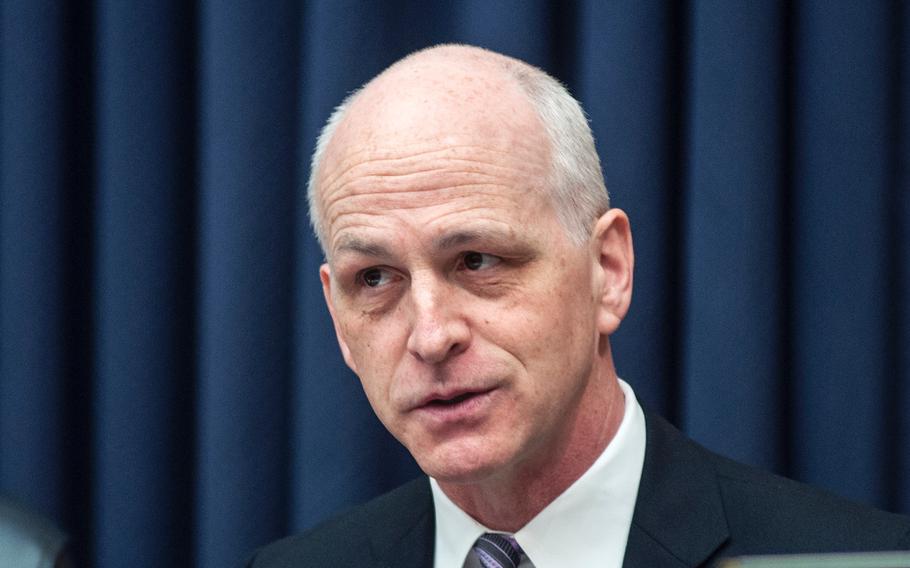
Ranking Member of the House Committee on Armed Services Rep. Adam Smith, D-Wash., questions Defense Department officials during a hearing on Capitol Hill in Washington, D.C., on Wednesday, March 7, 2018. (Carlos Bongioanni/Stars and Stripes)
WASHINGTON — A group of Democratic lawmakers introduced legislation Tuesday that would ban so-called “low-yield” nuclear weapons, which they contend increase the chance of war.
Sen. Ed Markey, D-Mass., joined Reps. Adam Smith, D-Wash., ranking Democrat on the House Armed Services Committee, Ted Lieu and John Garamendi, both D-Calif., and Earl Blumenauer, D-Ore., to introduce the legislation to prohibit research, development, production and deployment of low-yield nuclear warheads for submarine-launched ballistic missiles. The weapons have the potential to lower the threshold and increase the risk of the United States entering into nuclear war, the lawmakers said.
Their legislation, S. 3448 and H.R. 6840, follows President Donald Trump’s nuclear strategy unveiled earlier this year, which emphasizes the development of the low-yield nuclear weapons to deter threats from North Korea, Russia and China.
“We should not fund President Trump’s request for new low-yield nuclear weapons. His proposal dangerously lowers the threshold to nuclear use and siphons money away from genuine military readiness needs,” Smith said. “We already have a nuclear deterrent that is more than adequate to achieve our national security goals. Funding new, low-yield weapons would only draw us further into an unnecessary nuclear arms race and increase the risks of miscalculation.”
The 2018 Nuclear Posture Review, a policy document that the Trump administration unveiled in February, reaffirms a long-held American doctrine that includes limiting the use of nuclear weapons to “extreme circumstances” and the need to maintain the nation’s nuclear triad of land-, sea-, and air-based capabilities.
However, it also calls for the United States to develop new capabilities including the lower-yield nuclear warheads that could be fired from submarines. That capability is designed to ensure Russia is aware the United States has nuclear weapons that are not so devastating that the nation would risk detonating them, defense officials said at the time.
Opponents of the low-yield nuclear weapons argue the use of any nuclear weapon could quickly escalate and provoke war on much larger proportions.
The lawmakers’ “Hold the LYNE - or Low-Yield Nuclear Explosive - Act” looks to stop such a potential, they said.
“There’s no such thing as a low-yield nuclear war. Use of any nuclear weapon, regardless of its killing power, could be catastrophically destabilizing,” said Lieu, an Air Force veteran. “It opens the door for severe miscalculation and could drag the U.S. and our allies into a devastating nuclear conflict.”
Garamendi said his previous efforts to prohibit the authorization and funding to develop a low-yield nuclear warhead for a submarine-launched ballistic missile were narrowly defeated. The warheads will increase the risk of nuclear war and fuel a dangerous arms race, he warned.
In addition, the United States is already on track to spend more than $1.2 trillion in the next 30 years just to modernize and maintain its current nuclear arsenal, Garamendi argued.
“We should abandon our focus on outdated Cold War tactics and focus on the strategic challenges we face today, including accounting for the irresponsible spending on weapons we can’t afford to build and the world can’t afford for us to use,” Blumenauer said.
The legislation has been endorsed by more than two dozen groups that monitor the use of nuclear weapons, including the Arms Control Association, the Union of Concerned Scientists, Peace Action, the Women’s International League for Peace and Freedom and Concerned Citizens for Nuclear Safety.
“I don’t understand how anyone thinks building new ‘more-usable’ nuclear weapons will make us safer, when by definition, their creation increases the likelihood that nuclear weapons will be used,” said Paul Kawika Martin, senior director for policy and political affairs at Peace Action. “Instead of jump-starting a new arms race, we need to return to steadfast diplomacy to reduce and eliminate the world’s nuclear arsenals.”
Markey said the move towards low-yield nukes also marked the “height of fiscal and political folly.”
“Its development is just a further example of how the Trump administration is surrendering decades of American leadership that have helped move the world away from the dangers posed by nuclear weapons,” he said. “A nuclear weapon is a nuclear weapon, and the Trump administration’s attempts to market a new one are ill-advised and dangerous.”
Stars and Stripes reporter Corey Dickstein contributed to this story.grisales.claudia@stripes.com Twitter: @cgrisales